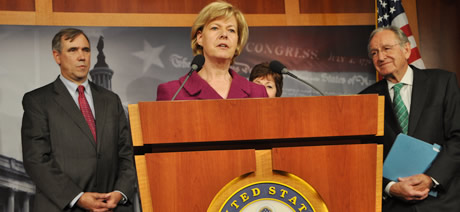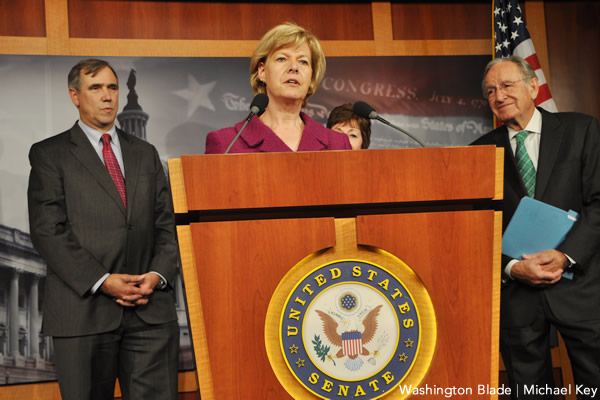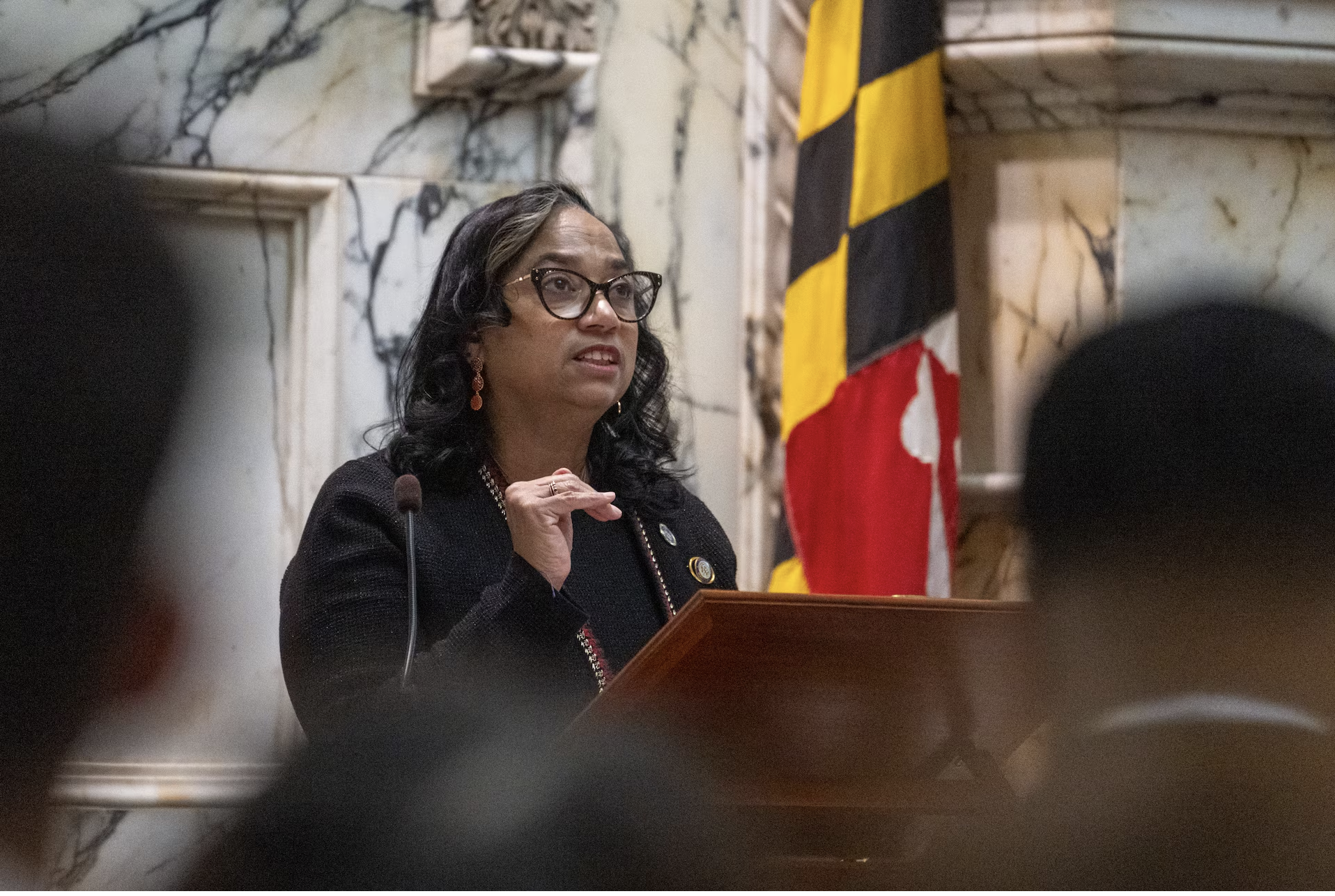News
HISTORIC: SENATE PASSES ENDA
10 Republicans join 54 Dems to approve pro-LGBT bill for first time


Sen. Tammy Baldwin (D-Wis.) is among the supporters of the Employment Non-Discrimination Act (Washington Blade photo by Michael Key).
For the first time in history, the U.S. Senate approved with bipartisan support a long sought piece of legislation that would bar employers from discriminating against or firing workers based on their sexual orientation or gender identity.
By a vote of 64-32, the Employment Non-Discrimination Act passed the Senate, marking the first time that either chamber of Congress has passed a version of the bill with protections for transgender workers.
A total of 10 Republicans voted in favor of the bill: Sens. Orrin Hatch (R-Utah), Susan Collins (R-Maine), Mark Kirk (R-Ill.), Rob Portman (R-Ohio), Pat Toomey (R-Pa.), Dean Heller (R-Nev.), Kelly Ayotte (R-N.H.), John McCain (R-Ariz.), Jeff Flake (R-Ariz.) and Lisa Murkowski (R-Alaska). All 54 Democrats present voted in favor of the legislation.
The vote also marks a turnaround for the Senate. In 1996, a version of ENDA came to the floor as part of a deal to bring up the Defense of Marriage Act for a vote, but the pro-gay bill failed at that time.
Prior to the vote, Sen. Jeff Merkley (D-Ore.), ENDA’s chief sponsor, delivered a speech on the Senate floor recognizing the historic nature of the moment.
“I look forward to this vote, this vote for liberty, this vote for freedom, this vote for opportunity, this vote for a fair and just America,” Merkley said.
Merkley also recognized the “champions of liberty” he said helped move ENDA forward like lesbian Sen. Tammy Baldwin (D-Wis.), Sen. Tom Harkin (D-Iowa) and Republican senators who joined in support of the bill.
Senators approved ENDA after three days of debate on the legislation, which began on Monday morning. Many senators spoke out in favor of the legislation ranging from Democrats like Sens. Barbara Boxer (D-Calif.) and Sherrod Brown (D-Ohio) to Republicans like Sens. Susan Collins (R-Maine) and Kelly Ayotte (R-N.H.).
Sen. Al Franken (D-Minn.) invoked the LGBT non-discrimination law in Minnesota as evidence the country can enact a similar statute on a nationwide basis.
“We have had this law in place for over 20 years in Minnesota, and what has been the effect?” Franken said. “For LGBT Minnesotans, it has meant that they don’t have to live in fear of being fired, or discriminated against in hiring, just because of who they are or whom they love. That is a big deal.”
The only senator to speak out in opposition to the legislation was Sen. Dan Coats (R-Ind.). On Thursday morning, Coats said he couldn’t bring himself to support ENDA out of concern for religious liberties of employers — despite the exemption in the bill for religious institutions.
“I oppose discrimination of any kind, and that includes discrimination of individuals or institutions for their faith and values, which often gets lost and has been lost in this discussion,” Coats said. “So there’s two types of discrimination here we’re dealing with and one of those goes to the very fundamental right granted to every American through our Constitution, a cherished value of freedom of expression and religion. And I believe this bill diminishes that freedom.”
Flake, who initially expressed opposition to the bill over its transgender protections, said he ultimately voted “yes” on the bill “to protect the rights of individuals.” In 2007, Flake voted as a U.S. House member for a version of ENDA with sexual orientation-only protections.
“While I had concerns about expanding protections beyond those House provisions, after consideration, I believe supporting this bill is the right thing to do,” Flake said. “I am hopeful that the bill moves forward in a way that works for employers as well as employees.”
McCain issued a similar statement saying he voted in favor of ENDA because of his opposition to employment discrimination.
“I have always believed that workplace discrimination – whether based on religion, gender, race, national origin or sexual orientation – is inconsistent with the basic values that America holds dear,” McCain said. “With the addition of an amendment I co-sponsored with Senators Rob Portman and Kelly Ayotte strengthening protections for religious institutions, I am pleased to support this legislation.”
Advocates praise vote, look to House of Representatives, White House
LGBT advocates heaped praise on the Senate for passing ENDA as they turned their attention to the House of Representatives, where Republican control makes passage significantly more challenging, and the White House.
Chad Griffin, president of the Human Rights Campaign, said the Senate made history “by standing up for a fundamental American truth.”
“Each and every American worker should be judged based on the work they do, and never based on who they are,” Griffin said. “This broad Senate coalition has sent a vital message that civil rights legislation should never be tied up by partisan political games.”
Tico Almeida, president of Freedom to Work, commended the Senate for approving ENDA on a bi-partisan basis and said the House should take the same action.
“The Senate has taken a bi-partisan and historic step toward ensuring that gay and transgender Americans have the same workplace protections that give all Americans a fair shot to succeed on the job,” Almeida said. “Our fight now moves to the House of Representatives where Speaker Boehner and the Republican Conference will have to decide which side of history they want to stand on.”
Both Griffin and Almeida said President Obama should follow up on the Senate vote by issuing an executive order barring federal contractors from engaging in LGBT discrimination.
Griffin said the directive would send a clear signal against “in support of workplace fairness” in addition to a House vote.
“This order is not a silver bullet, and ENDA is vitally necessary after the order is signed,” Griffin said. “But the Human Rights Campaign has long argued that, by signing the order, President Obama can extend workplace protections to over 16 million American workers.”
Tony Perkins, president of the anti-gay Family Research Council, responded to Senate passage of ENDA with dismay.
“Americans should be free to disagree, but ENDA would lead to a form of reverse discrimination,” Perkins said. “Anyone who expresses or promotes a view of family or morality that can be interpreted to be a disapproval of homosexual or transgender conduct will be subject to retaliation and discrimination.”
Despite claims like these from social conservatives, LGBT advocates have insisted that the bill would do nothing more than prohibit employers from discriminating against LGBT employees.
Speaking with the Washington Blade prior to the vote, Merkley said the task now for ENDA supporters is taking the momentum from the Senate to “create an irresistible pressure” for consideration in the House.
“With no shred of an argument to sustaining this type of discrimination, and a strong bi-partisan vote in the Senate, I hope we can create the pressure in the House to act,” Merkley said.
Similar to prior claims made by Senate Majority Leader Harry Reid (D-Nev.), Merkley predicted that ENDA would pass the House if Republican leadership held a vote on the legislation.
“I do believe that if an up-or-down vote was held on what we would pass through the Senate that it would pass the House,” Merkley said. “If a majority of the House is ready to say ‘no’ to discrimination, it is wrong for the leadership to block that vote, and I hope that they’ll come to see that view and allow such a vote to happen.”
White House Press Secretary Jay Carney addressed the vote on Thursday during his routine news briefing taking place at the same time, saying passage of ENDA in the House would be the “right thing to do because we’re all equal.”
“To oppose this kind of legislation is to announce that you want to be left behind by history,” Carney said. “The necessity of making sure that every American has equal rights is fundamental to our history and to who we are. And that’s what this legislation represents. Some of the objections that I’ve heard from members in the House are reminiscent of objections that opponents of other civil rights legislation put forward. And they were wrong then and they’re wrong now.”
The vote on final passage took place about 45 minutes after the Senate invoked cloture by a vote of 64-34 to end debate on the legislation.
The Senate earlier held a cloture vote Monday on ENDA, but that vote was to begin debate on the legislation. A second cloture vote was necessary to end debate and proceed to final vote.
ENDA amendments debated
Two amendments were also discussed with respect to the legislation. One was adopted, the other was not.
On Thursday, the Senate defeated an amendment proposed by Sen. Pat Toomney (R-Pa.) that would have expanded the groups eligible under ENDA’s religious exemption. That amendment, which required 60 votes to pass, failed on a 43-55 vote.
Prior to the vote, Toomey said his measure was an attempt to “strike an appropriate balance,” saying he opposes discrimination against LGBT people, but “another important American value is freedom, and particularly religious freedom.”
But Harkin spoke out on the Senate floor against the Toomey amendment for going too far. Noting ENDA already has a religious exemption, Harkin said if the Toomey amendment were approved, “thousands of for-profit businesses” would be allowed to discriminate.
Baldwin also said the expansion of the religious exemption that Toomey proposed wasn’t the appropriate balance.
“A capable employee in a non-religious [institution] should not be fired, or not be hired, because of his or her employer’s individual religious beliefs,” Baldwin said.
Sen. Lindsey Graham (R-S.C.) initially cast a vote “no” vote in opposition to the amendment. But just before the vote was called, he rushed into the Senate chamber to inform the clerk he wanted to vote “yes” on the measure.
Notably, even though his amendment failed, Toomey voted “yes” in favor of ENDA during final passage.
On Wednesday, the Senate adopted with no controversy by voice vote an amendment to ENDA, introduced by Sens. Rob Portman (R-Ohio) and Kelly Ayotte (R-N.H.), to ensure that institutions that invoke the religious exemption under ENDA won’t face retaliation from state, local or federal governments. LGBT advocates didn’t oppose the measure because they said it would simply reinforce the status quo.
Speaking on the floor, Ayotte commended the Senate for adopting the amendment to ENDA, which she said enables her to come on board in support.
“I have long been a strong supporter of the rights of conscience, of the rights under the First Amendment of the Constitution to religious freedom, and these protections are very important within this bill,” Ayotte said.
Two other amendments that were filed — one proposed by Sens. Mitch McConnell (R-Ky.) and Rand Paul (R-Ky.) to attach a national right-to-work law to ENDA, another proposed by Sen. David Vitter (R-La.) that reportedly would have banned sex-selective abortions — didn’t come up for a vote.
Merkley said only the Portman and Toomey amendments were allowed to come up as a part of a unanimous consent agreement reached on Wednesday.
Local
LGBTQ, LGBTQ-friendly congregations to hold holiday services
Bet Mishpachah’s Hanukkah service to take place on Friday

LGBTQ and LGBTQ-friendly congregations in D.C. will hold services and other events throughout the holiday season.
Bet Mishpachah on Friday will hold its Sparks in the Dark Happy Hour at Spark Social on 14th Street from 5:30-7:30 p.m. It’s Chanuka Shabbat Service will begin at the Edlavitch DC Jewish Community Center (1529 16th St., N.W.) at 8 p.m.
Hanukkah began on Sunday and will end on Dec. 22.
Two gunmen on Sunday killed 15 people and injured more than two dozen others when they opened fire at a Hanukkah celebration on Sydney’s Bondi Beach.
Jake Singer-Beilin, Bet Mishpachah’s chief rabbi, in a Facebook post mourned the victims.
“We grieve for the victims and send heartfelt prayers of healing for those who were wounded,” he wrote.
“This Chanuka, our lights will shine brightly in the darkness, but our hearts will be heavy with mourning for those who were murdered on Bondi Beach while observing what should have been a joyous day,” added Singer-Beilin. “We will still celebrate our Festival of Lights and we will commit ourselves to illuminating and repairing our broken world. Let us channel the bravery of the Maccabees who found hope where there seemed to be none, and who fought to create a better future. We must do the same.”
LGBTQ Catholic group to hold annual Christmas Day Mass
Dignity Washington’s Christmas Day Mass will take place at St. Margaret’s Episcopal Church (1820 Connecticut Ave., N.W.) on Dec. 25 from 6-7 p.m. Parishioners can attend in person or watch it online via Facebook.
The Metropolitan Community Church of Washington D.C.’s Christmas Eve service will take place at the church (474 Ridge St., N.W., on Dec. 24 at 6 p.m.
St. Thomas Episcopal Church (1517 18th St., N.W.) in Dupont Circle will hold its Christmas Eve Festival Eucharist from 5-6 p.m. A Christmas Eve dinner will take place in the Parish Hall from 6-8:30 p.m. The church’s Christmas Eve Festival Eucharist will occur on Dec. 25 from 10-11 a.m.
Washington National Cathedral throughout the holiday season has a number of services and events scheduled. These include the virtual Gospel Christmas Service on Dec. 21 from 6-7:30 p.m., the Family Christmas Service on Dec. 23 from 11 a.m. to noon, the Christmas Eve Festival Holy Eucharist on Dec. 24 from 10-11:45 p.m., and the Christmas Day Festival Holy Eucharist on Dec. 25 from 11:15 a.m. to 12:45 p.m.
The Foundry United Methodist Church (1500 16th St., N.W.) in Dupont Circle will hold its Christmas Eve Family Service on Dec. 24 at 4:30 p.m. Its Carols and Candlelight Service will take place at 8 p.m.
Smithsonian Anacostia Community Museum to celebrate Kwanzaa
The Smithsonian Anacostia Community Museum (1901 Fort Place S.E.) in Anacostia will mark the first day of Kwanzaa on Dec. 26 with storytelling and drumming with Mama Ayo and Baba Ras D from noon to 2 p.m. The museum will hold a series of other events through the 6-day celebration of African American culture that ends on Jan. 1.
The Creative Suitland Arts Center (4719 Silver Hill Road) in Suitland, Md., on Friday will hold their Almost Kwanzaa: A Creative Kind of Holiday event from 6-8:30 p.m.
Maryland
Joseline Peña-Melnyk elected Md. House speaker
Family immigrated to New York City from the Dominican Republic

By PAMELA WOOD | Moments after being elected speaker of the Maryland House of Delegates Tuesday, state Del. Joseline Peña-Melnyk stood before the chamber and contemplated her unlikely journey to that moment.
Born in the Dominican Republic, the Peña family lived in a small wooden house with a leaky tin roof and no indoor plumbing. Some days, she said, there was no food to eat.
When she was 8 years old, the family immigrated to New York City, where Peña-Melnyk was dubbed “abogadito” or “little lawyer” for helping her mother and others by translating at social services offices.
The rest of this article can be read on the Baltimore Banner’s website.
District of Columbia
D.C. students need academic support, diverse connections for economic mobility
Region offers array of resources for families in need of assistance

Education is the blueprint of good economic mobility.
But when students aren’t set up with the proper resources to secure a quality education, it’s often low-income families that suffer the most, For Love of Children (FLOC) Executive Director LaToya Clark said. Children from low-income families on average grow up to earn $25,600 annually, according to Opportunity Insights.
D.C. families need better economic mobility, and experts say that starts with kids getting an education and breaking generational poverty cycles. Students without a high school diploma earn $738 per week on average, while those who graduated high school earn roughly $930 per week, according to the U.S. Bureau of Labor Statistics. Contrarily, those with bachelor’s degrees earn about $1,543 per week.
Students from low-income backgrounds have fewer financial advantages on their paths to securing an education, and hardships faced by public schools make it difficult for them to catch up, Clark said.
From local financial and educational assistance programs to strengthening diversity among educators, here are a few ways researchers and advocates are fighting for better economic mobility in D.C. schools.
Student assistance programs
For many students, falling behind academically is because of circumstances outside of their control, Clark said.
She said teacher shortages, large classrooms and scarce funding can lead to an educational environment not fully equipped to set students on the right path. A one-dimensional education can then hinder future professional opportunities and give students limited economic mobility.
That’s where local organizations like FLOC come in –– to fill in the academic and social gaps often left open by schools.
Clark said FLOC has multiple services that give underserved students a more individualized academic experience. For the Neighborhood Tutoring Program, students are assessed at the grade level at which they’re performing, not what grade they are in. They’re then matched with a volunteer –– ranging from college students to retirees –– who follows a curriculum that matches the student’s performance level.
There’s also the Pathways Forward Program, an afterschool opportunity for D.C. youth in 7th to 12th grades designed to increase high school graduation rates. The program supports those at risk of academic failure to find a successful way forward, and those in 10th to 12th grades to prepare for graduation or transition to postsecondary programs. Both Neighborhood Tutoring and Pathways Forward are free.
“Everything we offer is designed to close achievement gaps, help our students boost their confidence and ensure young people have the skills and support that they need to succeed in schools and beyond,” Clark said.
And that design is working for students. Clark recalled a young girl who was the oldest of six who felt a need to help her mom take care of her siblings. She was falling behind in school until she found FLOC. The girl credited her ability to go to college and find a professional job to FLOC’s individualized and accessible approach to education.
FLOC is a reliable resource for D.C. youth to get academic help, but there are numerous other organizations working to close educational gaps and improve the future economic mobility of students.
Minds Matter D.C. helps underserved students find accessible pathways to prepare for and succeed in college. The organization offers mentoring, SAT prep, access to summer enrichment programs and guidance through the college application and financial aid process.
The work Minds Matter does addresses a disproportionate statistic: While roughly 89% of students from “well-off” families attend college, only 51% of students from low-income families do so, according to a report published by Brookings. Minds Matter reported that 100% of its students attended a four-year college or university.
The D.C. Schools Project, a program of the Center for Social Justice, offers academic help and English-language tutoring for low-income and immigrant families. Each semester, roughly 60 tutors assist about 100 students, their families, and other D.C. immigrants.
D.C. CAP Scholars has a mission to connect youth with financial and academic opportunities that will help them succeed in college. Registration is now open for the organization’s Ward 7 & 8 scholarship, a $12,000 annual scholarship for students who attended high school in those D.C. wards. Those areas encompass communities such as Congress Heights, Deanwood and Anacostia, which are some of the city’s poorest areas.
RISE offers tutoring and college mentoring to underserved populations. Its primary focus is on opportunity academies, including the three in D.C.: Ballou STAY, Luke C. Moore and Garnet-Patterson STAY. These academies are “second chance” schools for students who didn’t complete high school on a traditional timeline.
RISE Executive Director Ricardo Cooper said the organization offers real-time tutors for students in these academies through its Keep Up Tutoring program. RISE also provides summer literacy “bootcamps” and college prep for underserved students.
As a native Washingtonian, Cooper said he wishes opportunities like RISE were available to him as a kid. That’s why it’s so special for him to lead the organization and help D.C. youth rise above the academic and economic barriers he used to face.
“We know that going to college and getting a degree makes you more money,” Cooper said. “Being able to have these programs to support youth in school, to make sure that they feel confident once they graduate high school, to go to college, to feel confident in completing their coursework and just understanding the material is important to raise that poverty line.”
While these programs are crucial to many students’ success, Matthew Shirrell, associate professor of educational leadership at George Washington University, said there are many fundamental solutions to supporting kids that schools should recognize.
Diverse learning opportunities
Shirrell’s research has identified a key link to the positive relationships between teachers and students: diversity.
“Having a more diverse teaching workforce would certainly benefit all students, because it’s like their teachers having access to a library with a whole bunch of different perspectives,” Shirrell said.
He said teachers have a continuously growing list of responsibilities not just academically, but in dealing with social and emotional issues that students bring to school. By having a diverse team of educators in each school, teachers are better equipped to connect with students to turn potential barriers into new pathways.
But achieving this is about more than championing diversity –– it’s a way for students to secure better futures and stay out of the criminal justice system, Shirrell said.
Shirrell pointed to the idea of “exclusionary discipline.” In his research, Shirrell found that Black and LatinX students were significantly less likely to be suspended from school when they had teachers who shared their racial or ethnic background.
Teachers of different backgrounds than their students tend to rely on harsh disciplinary action, when in reality the situation could come down to cultural misunderstandings or misconceptions, Shirrell said.
In the long run, this disciplinary bias can disproportionately impact underserved communities. Shirrell said relentless discipline can lead to the students making poor decisions outside of school and potentially ending up in the criminal justice system.
At such a formative age, students need the support, understanding and guidance that only a diverse population of educators can bring.
“You really can’t get that from a book,” Shirrell said. “The best way to learn that is from working alongside somebody who you know is doing things differently than you. There’s tremendous value to having a diverse workforce, whether that be racial, linguistic or economic.”
Securing an education from open-minded teachers is especially important in underserved pockets of D.C., such as Wards 7 and 8. D.C. youth can experience completely different lives and opportunities just by living around the block. Diverse educators can help fill social gaps, but having students from different economic backgrounds share a classroom pushes them to see different points of views and develop their critical thinking skills, Shirrell said.
Luckily, that sentiment rings true in D.C., a city with high social capital –– or the likelihood of low-income people and high-income people becoming friends or crossing paths. About 50% of the friends of low-income people have high incomes, and low-income people are only 4.7% less likely to friend high-income people they meet, according to Opportunity Insights.
Though there’s never one simple solution in growing economic mobility for students and their families, Cooper, the RISE executive director, said having educators who embody multiple perspectives –– as well as ensure students are aware of the financial and academic support programs available to them –– are strong ways to set a child on a brighter financial and professional path.
“There are a lot of factors that also go along with [improving economic mobility], but chances are better once students feel confident in who they are, confident in what they can do and go to college and excel,” Cooper said.
This article is part of a national initiative exploring how geography, policy, and local conditions influence access to opportunity. Find more stories at economicopportunitylab.com.
-

 The White House5 days ago
The White House5 days agoAs house Democrats release Epstein photos, Garcia continues to demand DOJ transparency
-

 District of Columbia5 days ago
District of Columbia5 days agoCapital Pride announces change in date for 2026 D.C. Pride parade and festival
-

 Virginia5 days ago
Virginia5 days agoDOJ seeks to join lawsuit against Loudoun County over trans student in locker room
-

 Photos4 days ago
Photos4 days agoPHOTOS: The Holiday Show


















